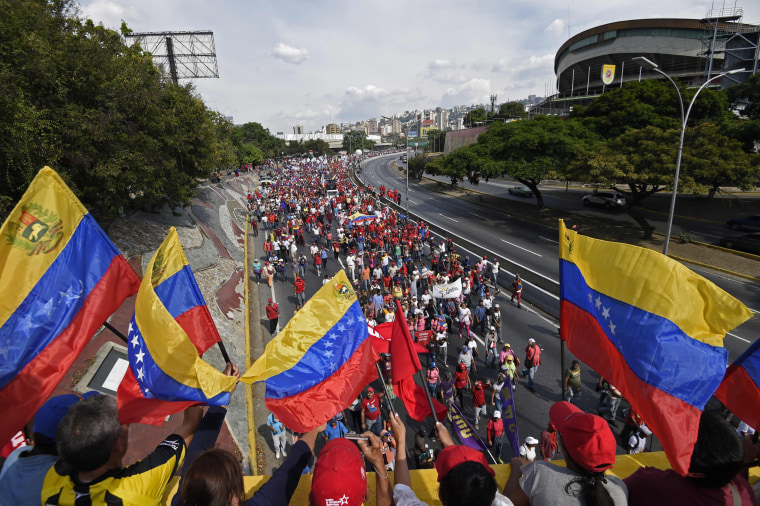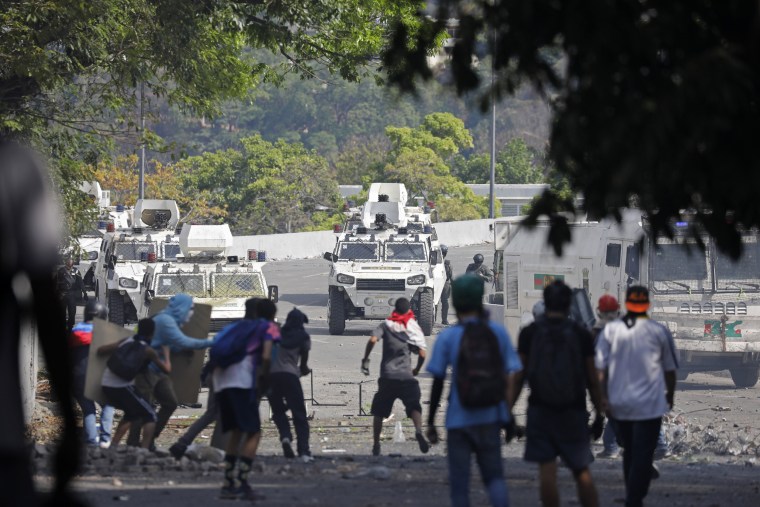The bill of particulars against Venezuelan leader Nicolas Maduro is long. The country’s ills have continued to fester since he took power six years ago after the death of the strongman Hugo Chavez. The current violence contesting his legitimacy, rampant crime and societal chaos all land at his feet.
He’s the one who systematically weakened democratic institutions in Venezuela. That includes stacking the country’s Supreme Court with loyalists and, in recent days, taking CNN and the BBC off the air, leading to an information vacuum for Venezuelan residents. Angry citizens have taken to the streets to call for his replacement by opposition leader Juan Guaidó — who claims to be the true winner of fraudulent presidential elections held last May — because of true popular discontent rather than anything the U.S. has stoked. Indeed, for several years, Venezuelans have been marching in the streets to protest food shortages, blackouts and rising crime.
However calibrated and multilateral the U.S. is being today, that’s not how the hegemon has always acted
Yet the Maduro regime, not surprisingly, blames the current violence and upheaval on the United States. “This is directly planned in Washington, in the Pentagon and Department of State, and by Bolton," Foreign Minister Jorge Arreaza told Reuters Tuesday, referring to U.S. National Security Adviser John Bolton. “They are leading this coup and giving orders to this man (Juan) Guaidó.”
Similarly, in mid-March Maduro claimed without evidence that a U.S.-backed cyber “sabotage” prompted a six-day power outage. Maduro also cites American-led sanctions, which he says make it harder for ordinary citizens to access food, medicine and medical equipment.
It’s not that the Trump administration has done nothing to influence the course of events in the South American nation; indeed, it has imposed the sanctions Maduro points to. The sanctions, which actually began during the Obama administration, have slowly cut off the country’s access to outside supplies and capital as it targets major Venezuela institutions and power brokers tied to Maduro.
But the Trump administration’s efforts to help Guaidó assume power have been through peaceful means, such as the sanctions and rhetoric. Though critics might call the latter bellicosity, it represents words, not action. (And there have been some Venezuelans who have called for exactly that.) The U.S. also immediately recognized Guaidó as the legitimate leader of Venezuela when he proclaimed himself president. But that move was quickly endorsed by a swath of Latin American and European countries.
And there’s the rub. However calibrated and multilateral the U.S. is being today, that’s not how the hegemon has always acted, and it doesn’t mean that the U.S. is blameless for the current mess to its south. The U.S. sowed the seeds for the chaos we’re seeing in Venezuela now.
The tensions go way back.
Though once strong commercial partners, the U.S. and Venezuela had by the late 1950s become estranged over American Cold War policies in Latin America. Particularly Washington’s proclivity for supporting strongmen propped up by the CIA and other U.S. assets with the goal of keeping communist threats – real and perceived – at bay. Even though Venezuela never suffered a U.S.-imposed leader, as happened to democratically elected regimes in Guatemala and later Chile, feelings ran strong against what many perceived as American imperialism.
It was in Venezuela that these feelings reached their boiling point. Vice President Richard Nixon arrived in Caracas in May 1958 as part of what was supposed to be a goodwill tour to strengthen relations with America’s southern neighbors. Instead, in a dramatic manifestation of the region’s frustrations, an angry crowd nearly overturned Nixon’s car, forcing him to take refuge in the U.S. Embassy.
And long after the fall of the Berlin Wall, as globalization seemed to bring Western Hemisphere countries closer together economically, many Venezuelans still viewed Washington with distrust. The populist autocrat Chavez took office in Venezuela in 1999, his rise aided by widespread anti-American sentiment. He played off of the country’s massive income inequality and a sense that foreign oil companies were ripping the country’s natural resources from the ground.
Washington’s compromised position in the region hamstrings it because interference would taint the opposition
In 2002, Chavez survived a brief coup attempt that President George W. Bush’s administration was widely believed to have encouraged; the administration came under intense scrutiny after admitting U.S. officials had held a series of meetings around that time with Venezuelan military officers and opposition activists.
That grain of truth fed into a multitude of conspiracy theories that painted the U.S. as the puppeteer behind anything bad that happened in the country. The paranoia allowed Chavez to escape responsibility for his gross misrule, clearing the way for his anointed successor, Maduro, to take his place despite rampant unemployment and societal breakdown.
SIGN UP FOR THE THINK WEEKLY NEWSLETTER HERE
One of the few things most Venezuela experts agree on at this point is that the U.S. should stay away from heavy-handed intervention now. Washington’s compromised position in the region hamstrings it because interference would taint the opposition, provoking distrust and even anger among Venezuelans while lending legitimacy to Maduro’s accusations in his quest to deflect blame.
That’s what makes some Trump administration rhetoric so scary — even if its actions to date have been relatively calculated and measured.
Trump himself in tweets Tuesday threatened a “full and complete embargo” and sanctions on close Maduro ally Cuba if its troops did not cease operations in Venezuela. And Bolton followed suit by saying “all options are on the table” as far as American intervention goes.
Perhaps just as alarming to Latin American observers, in March Bolton essentially invoked the Monroe Doctrine, a U.S. policy promulgated in the 19th century declaring that Spanish-speaking countries to America’s south are effectively within a U.S. sphere of influence rather than independent actors with their own national needs and interests.

“In this administration, we're not afraid to use the phrase Monroe Doctrine. This is a country in our hemisphere. It's been the objective of American presidents going back to Ronald Reagan to have a completely democratic hemisphere,” Bolton said in an early March CNN interview. “I mentioned at the end of last year that we’re looking at the ‘Troika of Tyranny,’ including Cuba, Nicaragua, as well as Maduro.”
To many listeners up and down the Western Hemisphere, it sounded an awful lot like President George W. Bush’s invocation of a North Korea-Iran-Iraq “axis of evil.”
Trump’s non-interventionist foreign policy proclivities suggest he’s loath to send U.S. troops into the Venezuelan fray, or otherwise commit American blood and treasure. But if he is willing to, such military action is likely to end up about as well for American strategic interests as did the Iraq War.

